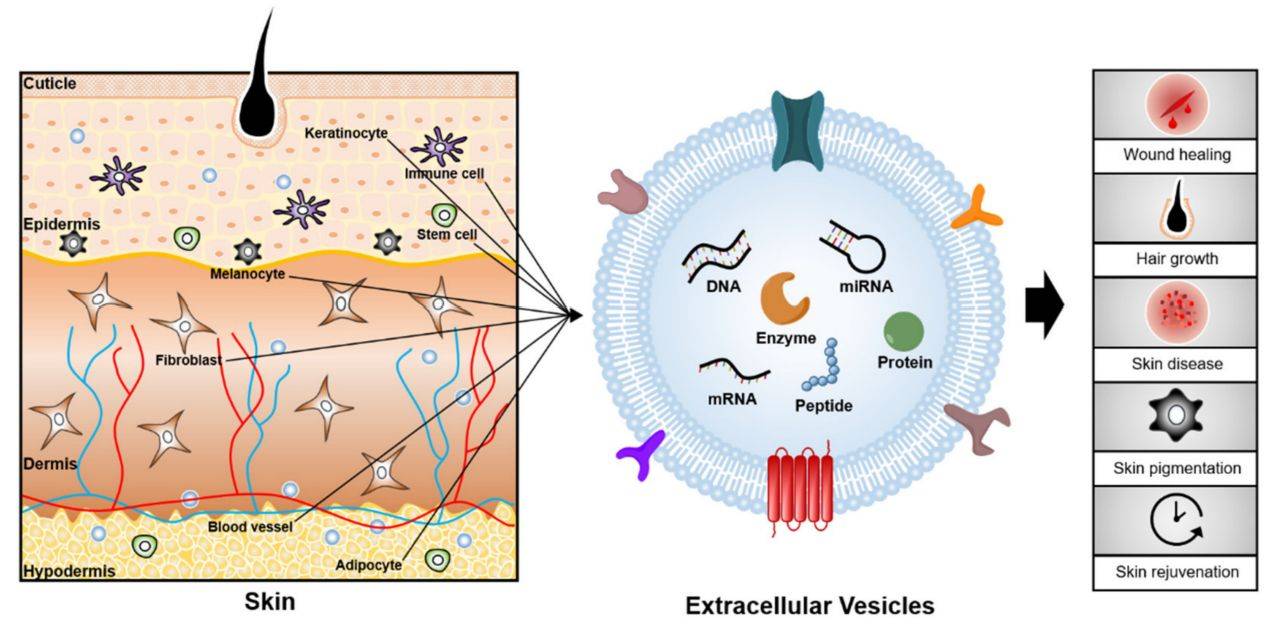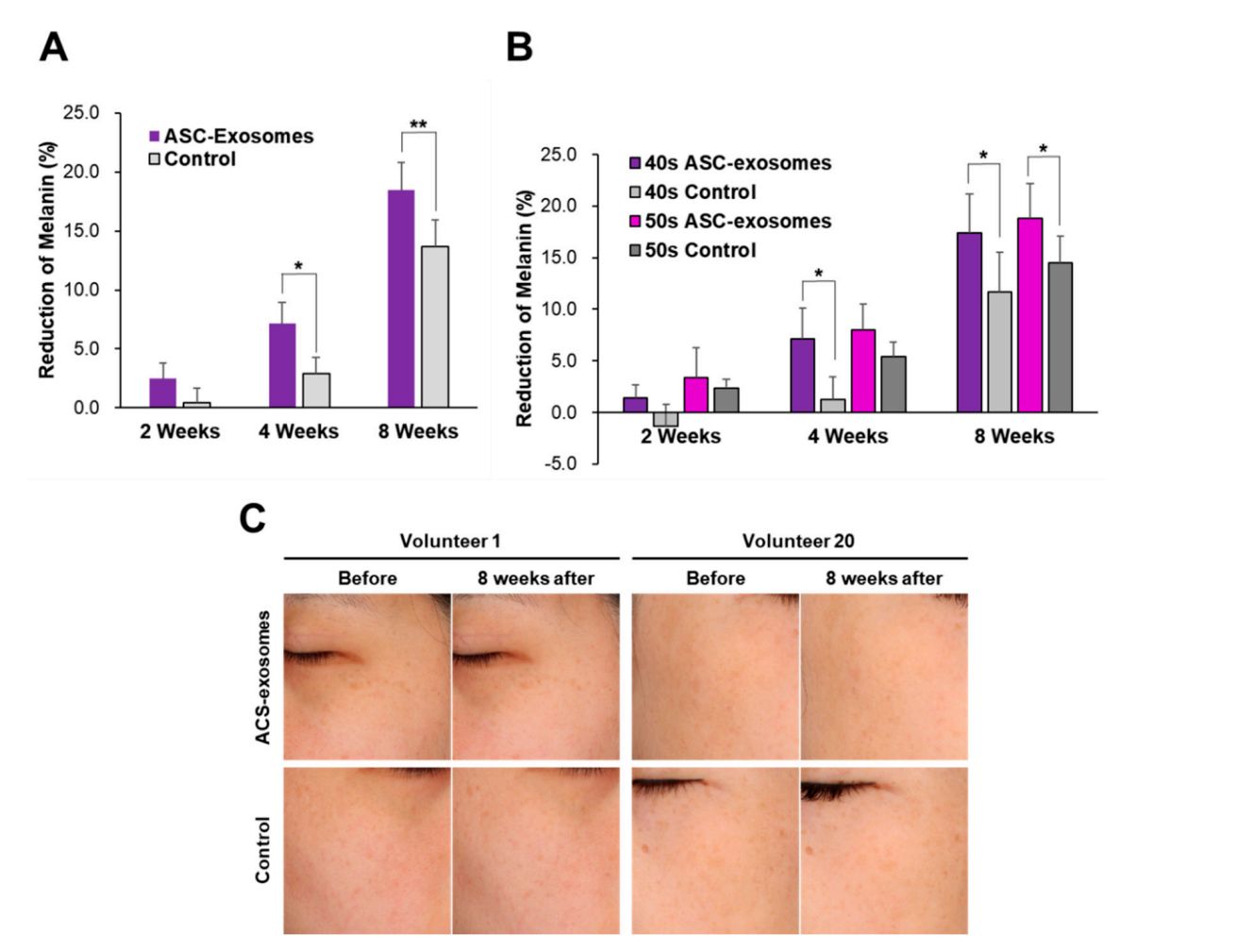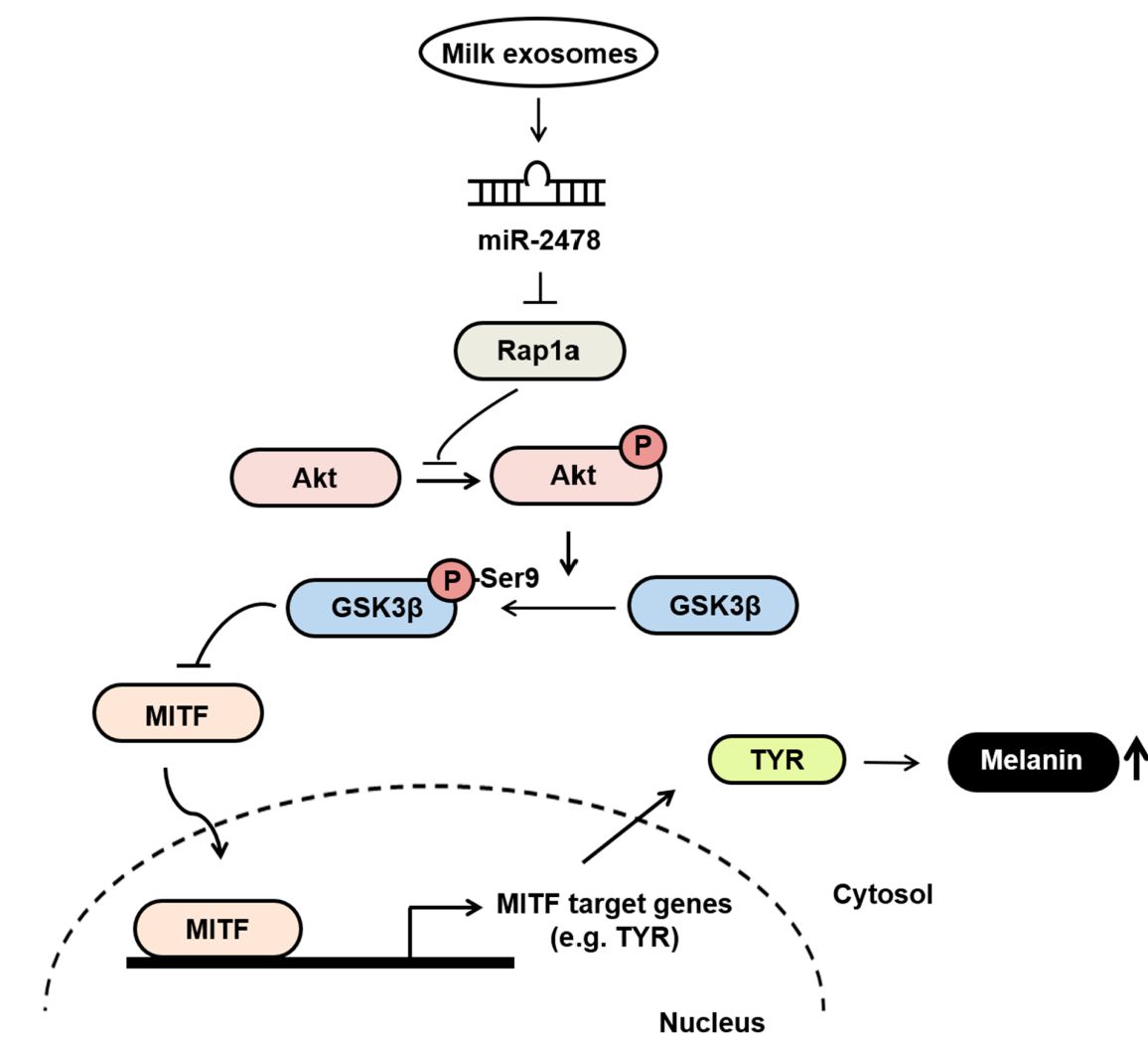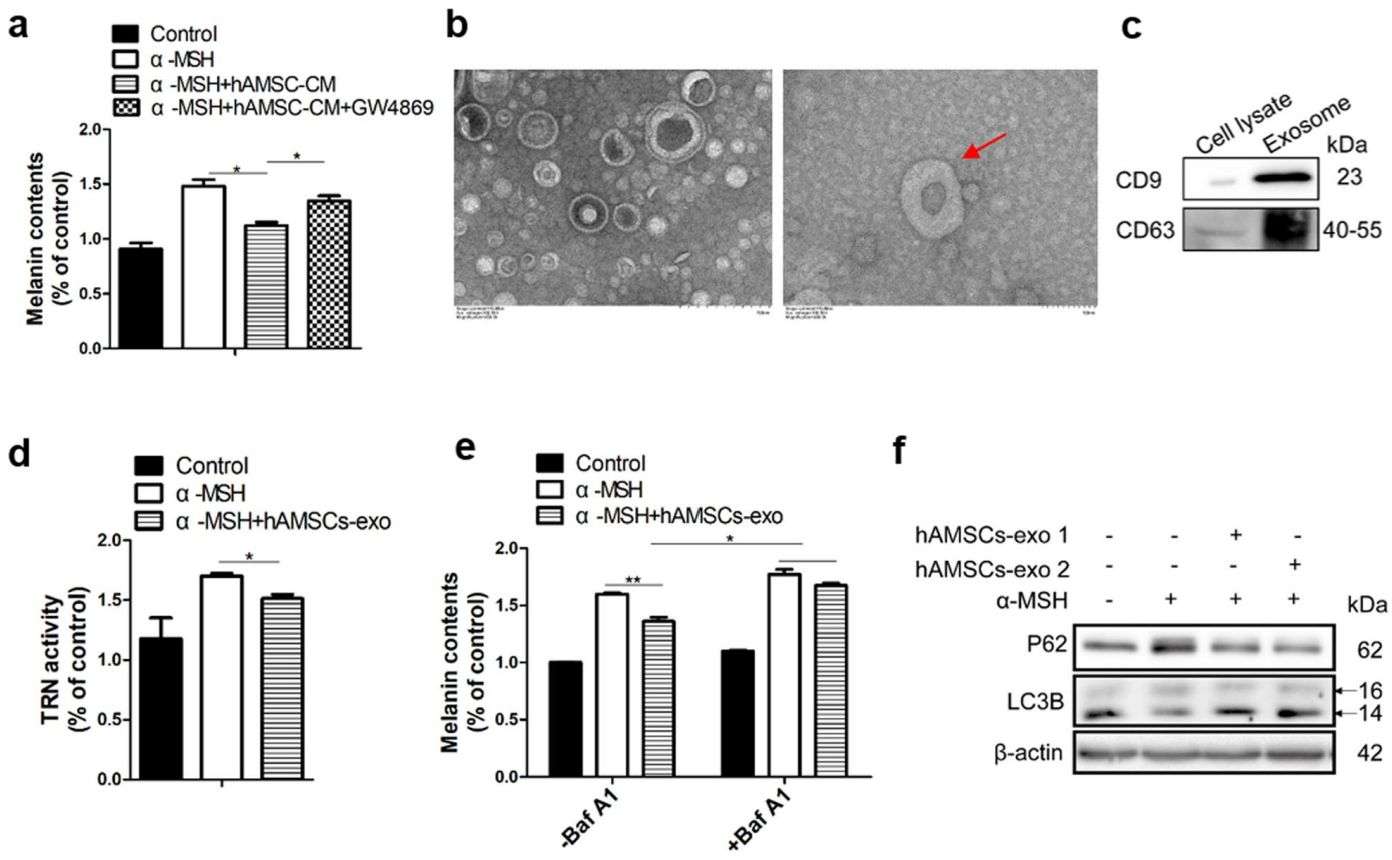Exosome Therapy in Whitening and Pigmentation Regulation
In recent years, exosome research has continued to heat up, with research teams worldwide piling into this field. Exosomes have taken the global beauty market by storm mainly because of their remarkable efficacy in whitening, anti-aging, and skin regeneration. The study of exosomes in skin whitening is still in the beginning stage. Further, in-depth research is needed to understand the detailed functions and mechanisms of exosomes in skin whitening.
 Figure 1. Exosomes and their effects on the skin. (Kim H, et al., 2021)
Figure 1. Exosomes and their effects on the skin. (Kim H, et al., 2021)
The Role of Exosomes in Skin Whitening
Exosomes have emerged as a promising therapeutic approach in the field of cosmetic dermatology, especially for skin whitening and inhibiting pigmentation. Recent advances in exosome research have revealed the mechanisms by which these extracellular vesicles contribute to the improvement of skin color.
- Melanin Regulation
Researchers have identified specific exosome-derived biomolecules, such as miRNAs and proteins, that regulate the activity of melanocytes (the cells responsible for melanin production). By down-regulating the expression of key enzymes involved in melanin production, exosomes have shown the ability to inhibit melanin synthesis, resulting in a more even, lighter skin tone.
- Antioxidant and Anti-inflammatory
Exosomes have been shown to have powerful antioxidant and anti-inflammatory properties, which are essential for treating hyperpigmentation and blemishes. Substances in exosomes, including antioxidant enzymes and anti-inflammatory molecules, can help neutralize free radicals, reduce oxidative stress, and attenuate the inflammatory processes that lead to skin discoloration.
- Skin Barrier Improvement
Exosomes enhance the integrity and function of the skin barrier, which plays a vital role in maintaining a healthy, even skin tone. Lipids, proteins, and other biomolecules within exosomes strengthen the stratum corneum, improve hydration, and reduce transepidermal water loss, resulting in skin that looks more radiant and blemish-free.
- Cell Recovery and Regeneration
Exosomes have been found to stimulate the proliferation and differentiation of skin cells such as keratinocytes and fibroblasts. As the skin's natural regeneration process is enhanced, this can help improve the appearance of blemishes, scars, and age-related skin problems.
Why Use Exosome Whitening?
Hyperpigmentation or Melanosis is a skin condition caused by an excessive accumulation of melanin in the skin, which can make the skin look unsightly. Treating hyperpigmentation remains challenging, and there is an unmet need for safe and effective alternatives for skin lightening. In recent years, the cosmetic industry has also shown increasing interest in the application of exosomes. Functional cosmetics with the addition of specific exosomes help to lighten the skin by preventing melanin deposition on the skin.
 Figure 2. Clinical Evaluation of the Effectiveness of ASC-Exosomes for Skin Lightening. (Cho BS, et al., 2020)
Figure 2. Clinical Evaluation of the Effectiveness of ASC-Exosomes for Skin Lightening. (Cho BS, et al., 2020)
Advantages of Exosomes over Traditional Whitening Ingredients
- Efficacy
Clinical studies have shown that exosomes have excellent efficacy in improving skin tone, reducing pigmentation, and fading blemishes and age spots. The multifaceted mechanism of action of exosomes, including melanin regulation, antioxidant and anti-inflammatory effects, and skin barrier enhancement, contributes to the overall effectiveness of exosome therapy.
- Safety
Exosomes are generally considered safe because they are derived from natural, biocompatible sources and contain no synthetic or harsh chemicals. The natural components of exosomes, including lipids, proteins, and genetic material, make them well tolerated by the skin and minimize the risk of adverse reactions.
- Skin Compatibility
Exosomes are inherently compatible with the natural biology of the skin, as they are derived from the body's cells and can be seamlessly integrated with the skin's functions. The bioactive molecules within exosomes work in harmony with the skin's processes to promote more natural and holistic skin whitening and brightening.
Application Examples
- miR-2478 in milk-derived exosomes inhibits melanogenesis
Milk-derived exosomes contain many endogenous microRNA (miRNA) molecules that play important roles in biological processes. Researchers found that specific miR-2478 in milk-derived exosomes inhibited melanin production. MiR-2478 overexpression decreased the target Rap1a expression, which led to the downregulation of melanogenesis-related gene expression. These results suggest that milk-derived exosomes may improve the whitening effect.
 Figure 3. Milk-derived exosomes inhibit melanogenesis in melanoma cells. (Bae IS, Kim SH., 2021)
Figure 3. Milk-derived exosomes inhibit melanogenesis in melanoma cells. (Bae IS, Kim SH., 2021)
- Human amniotic stem cell-derived exosomes inhibit melanogenesis and promote melanosome degradation
Skin hyperpigmentation is caused by an imbalance between melanin synthesis in melanocytes and melanin degradation in keratinocytes. Human amniotic stem cells (hASC) have been reported to have potent anti-skin pigmentation effects. Researchers demonstrated that hASC exosome-derived miR-181a-5p and miR-199a significantly inhibited melanogenesis by inhibiting MITF and promoting melanosome degradation through activation of autophagy, respectively.
 Figure 4. Exosomes from hAMSCs inhibit pigmentation by regulating autophagy. (Wang XY, et al., 2021)
Figure 4. Exosomes from hAMSCs inhibit pigmentation by regulating autophagy. (Wang XY, et al., 2021)
Our Services and Products
Creative Biostructure is at the forefront of exosome research, harnessing the vast potential of these extracellular vesicles to address skin pigmentation. As a leading provider of exosome products and services, we help clients unlock the transformative properties of exosomes to achieve skin lightening and inhibit pigmentation.
Our team of scientists is dedicated to unraveling the complex mechanisms by which exosomes regulate melanin production, enhance skin barrier function, and promote cell regeneration. Feel free to contact us for more information.
| Cat No. | Product Name | Source |
| PNE-VC02 | PNExo™ Exosome-Celery | Exosome derived from Celery |
| Exo-PDELN02 | HQExo™ Exosome-Ginger | Exosome derived from Ginger |
| PNE-VB13 | PNExo™ Exosome-Broccoli | Exosome derived from Broccoli |
| PNE-VE31 | PNExo™ Exosome-Enoki | Exosome derived from Enoki |
| PNE-FB33 | PNExo™ Exosome-Blackberry | Exosome derived from Blackberry |
| PNE-FC38 | PNExo™ Exosome-Cranberry | Exosome derived from Cranberry |
| PNE-FB42 | PNExo™ Exosome-Banana | Exosome derived from Banana |
| PNE-FP93 | PNExo™ Exosome-Prickly Pear | Exosome derived from Prickly Pear |
| PNE-FLC24 | PNExo™ Exosome-Canna | Exosome derived from Canna |
| PNE-FLC30 | PNExo™ Exosome-Carnation | Exosome derived from Carnation |
| PNE-FLA31 | PNExo™ Exosome-Amaryllis | Exosome derived from Amaryllis |
| PNE-FLC42 | PNExo™ Exosome-Begonia | Exosome derived from Begonia |
| Exo-SC01 | HQExo™ Exosome-PCS-500-011 | Exosome derived from human pre-adipose derived mesenchymal stem cell (PCS-500-011) |
| Exo-SC03 | HQExo™ Exosome-hTERT | Exosome derived from hTERT-immortalized Mesenchymal Stem Cell |
| Exo-SC04 | HQExo™ Exosome-MSC | Exosome derived from Xeno-Free Human Mesenchymal Stem/Stromal Cells and Media |
| Exo-SC02-1 | HQExo™ Exosome-PCS-500-012 | Exosome derived from human bone marrow-derived mesenchymal stem cell line (PCS-500-012) |
| Exo-SC02-2 | HQExo™ Exosome-Pla-MSC | Exosome derived from human placental derived mesenchymal stem cell |
| Explore All Exosome Products | ||
References
- Kim H, et al. Extracellular Vesicles as Potential Theranostic Platforms for Skin Diseases and Aging. Pharmaceutics. 2021. 13(5): 760.
- Cho BS, et al. Skin Brightening Efficacy of Exosomes Derived from Human Adipose Tissue-Derived Stem/Stromal Cells: A Prospective, Split-Face, Randomized Placebo-Controlled Study. Cosmetics. 2020. 7(4): 90.
- Bae IS, Kim SH. Milk Exosome-Derived MicroRNA-2478 Suppresses Melanogenesis through the Akt-GSK3β Pathway. Cells. 2021. 10(11):2848.
- Wang XY, et al. Human amniotic stem cells-derived exosmal miR-181a-5p and miR-199a inhibit melanogenesis and promote melanosome degradation in skin hyperpigmentation, respectively. Stem Cell Res Ther. 2021. 12(1): 501.
